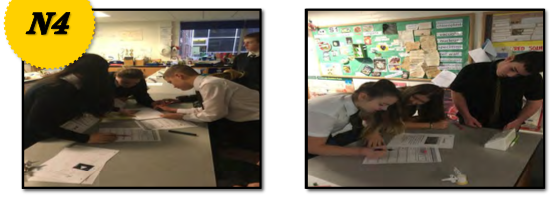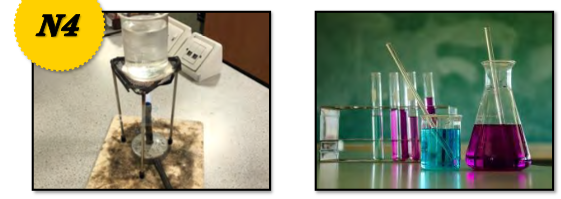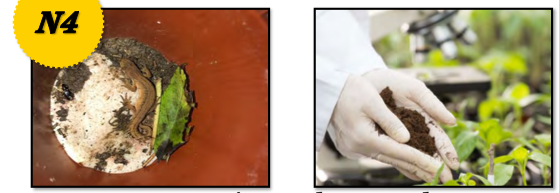Biology
What will I learn?
The National 4 Biology Course covers major areas of biology including cells, organisms and ecosystems. The key areas of biodiversity, interdependence, body systems and cells and inheritance are developed through the Course.
It comprises of four units:
Cell Biology
The key areas covered are: cell division; DNA; genes and chromosomes; therapeutic use of cells; enzymes; microorganisms; photosynthesis; respiration; controversial biological procedures.
Multicellular Organisms
The key areas covered are: sexual and asexual reproduction; propagating and growing plants; commercial use of plants; genetic information, growth and development of different organisms; biological actions in response to internal and external changes to maintain stable body conditions.
Life on Earth
The key areas covered are how animal and plants species depend on each other; biodiversity, nitrogen cycle, fertilisers; adaptations for survival; learned behaviour in response to stimuli linked to species survival.
Added Value Unit
In this Unit, learners will investigate a topic in depth, consider its impact on the environment and/or society, and present their information in the form of a written report or poster.
How will I learn?
Learners will develop and apply their knowledge of Biology by working collaboratively to carry out experiments, research tasks and presentations. This will enable them to develop their scientific inquiry, investigative and analytical thinking skills in a biological context. They will also have opportunities to discuss and debate the moral and ethical implications of current biological issues.
There will be opportunities for the development of literacy and numeracy skills and where appropriate, aspects of health and wellbeing and ICT will be included.
How will I be assessed?
Learners will be required to pass the SQA Unit Assessments for each of the three theory units. They will also be required to carry out a practical investigation as part of their assessment. The written evidence for the Added Value Unit will also be assessed internally.
There is no external exam at National 4 level.
Career Opportunities
There are many and varied career opportunities for students of Biology including research, teaching, medicine, dentistry, nursing, midwifery, physiotherapy, occupational health, pharmacy, sport sciences, food industry, veterinary medicine, zoology/animal care, forensics, hairdressing, farming, renewable energy, etc. The skills developed in Science subjects can also lead to careers in many other areas.

Chemistry
What will I learn?
The National 4 Chemistry Course covers a variety of contexts relevant to chemistry’s impact on the environment and society through the chemistry of the Earth’s resources, the chemistry of everyday products and environmental analysis. The key areas of atomic structure, bonding and chemical equations are integrated throughout the course.
It comprises of four units:
Chemical Changes and Structure
In this unit the topics covered are atomic structure and bonding; energy changes of chemical reactions; acids and bases.
Nature’s Chemistry
In this unit the topics covered are fuels and hydrocarbons; carbohydrates and consumer products; plants for medicines.
Chemistry in Society
In this unit the topics covered are metals and alloys; electrochemical cells and batteries; corrosion; polymers and polymerisation; fertilisers; nuclear chemistry; chemical analysis.
Added Value Unit
In this Unit, learners will investigate a topic in depth, consider its impact on the environment and/or society, and present their information in the form of a written report or poster.
How will I learn?
Learners will develop and apply their knowledge of Chemistry by working collaboratively to carry out experiments, research tasks and presentations. This will enable them to develop their scientific inquiry, investigative and analytical thinking skills in a chemical context. They will also have opportunities to discuss and debate the moral and ethical implications of current chemical issues.
There will be opportunities for the development of literacy and numeracy skills and where appropriate, aspects of health and wellbeing and ICT will be included.
How will I be assessed?
Learners will be required to pass the SQA Unit Assessments for each of the three theory units. They will also be required to carry out a practical investigation as part of their assessment. The written evidence for the Added Value Unit will also be assessed internally.
There is no external exam at National 4 level.
Career Opportunities
There are many and varied career opportunities for students of Chemistry including research, teaching, medicine, dentistry, pharmacy, engineering, food industry, veterinary medicine, forensics, oil/gas/ nuclear industries, pharmaceutical industry, environmental monitoring, renewable energy, hairdressing, farming, technology, etc. The skills developed in Science subjects can also lead to careers in many other areas.

Environmental Sciences
What will I learn?
The National 4 Environmental Science Course aims to develop an understanding of environmental issues. It provides a range of up-to-date topics relevant to the role of environmental science in society. Through the Course, learners will investigate key areas of the living environment, the Earth and its resources. It allows learners the opportunity to investigate sustainability and sustainable development.
It comprises of four units:
Living Environment
The key areas covered are: interdependence; adaptation for survival; the impact of population growth and natural hazards on biodiversity; the nitrogen cycle; the environmental impact of fertilisers.
Earth’s Resources
The key areas covered are: the responsible use and conservation of non- renewable and renewable resources; the formation and use of fossil fuels; the derivation and uses of materials derived from crude oil; the risks and benefits of different energy sources, including those produced from plants; the carbon cycle and processes involved in maintaining the balance of gases in the air; the causes and implications of changes in the balance.
Sustainability
The key areas covered are: the sustainability of key natural resources and possible implications for human activity; the interaction between humans and the environment and the impact of human activity on an area; the role of agriculture in the production of food and raw material and its environmental impacts and sustainability; society’s energy needs and the impact of developments in transport infrastructure in a selected area; and development of sustainable systems.
Added Value Unit
In this Unit, learners will investigate a topic in depth, consider its impact on the environment and/or society, and present their information in the form of a written report or poster.
How will I learn?
Learners will develop and apply their knowledge of Environmental Science by working collaboratively to carry out experiments, research tasks and presentations. This will enable them to develop their scientific inquiry, investigative and analytical thinking skills in an environmental context. They will also have opportunities to discuss and debate the moral and ethical implications of current environmental issues.
There will be opportunities for the development of literacy and numeracy skills and where appropriate, aspects of health and wellbeing and ICT will be included.
How will I be assessed?
Learners will be required to pass the SQA Unit Assessments for each of the three theory units. They will also be required to carry out a practical investigation as part of their assessment. The written evidence for the Added Value Unit will also be assessed internally.
There is no external exam at National 4 level.
Career Opportunities
There are many and varied career opportunities for students of Environmental Science including research, teaching, renewable energy, marine biology, conservation, waste management, water treatment, environmental monitoring, horticulture, etc. The skills developed in Science subjects can also lead to careers in many other areas.

Physics
What will I learn?
The National 4 Physics Course enables learners to develop the ability to solve problems and establish relationships in physics by acquiring a broad knowledge base, practical skills and basic mathematical skills.
It comprises of four units:
Electricity and Energy
The key areas covered are generation of electricity; electrical power; electromagnetism; practical electrical and electronic circuits; gas laws and the kinetic model.
Waves and radiation
The key areas covered are wave characteristics; sound; electromagnetic spectrum; nuclear radiation.
Dynamics and Space
The key areas covered are speed and acceleration; relationships between forces, motion and energy; satellites and cosmology.
Added Value Unit
In this Unit, learners will investigate a topic in depth, consider its impact on the environment and/or society, and present their information in the form of a written report or poster.
How will I learn?
Learners will develop and apply their knowledge of Physics by working collaboratively to carry out experiments, research tasks and presentations. This will enable them to develop their scientific inquiry, investigative and analytical thinking skills in a physical context.
There will be opportunities for the development of literacy and numeracy skills and where appropriate, aspects of health and wellbeing and ICT will be included.
How will I be assessed?
Learners will be required to pass the SQA Unit Assessments for each of the three units. They will also be required to carry out a practical investigation as part of their assessment. The written evidence for the Added Value Unit will also be assessed internally.
There is no external exam at National 4 level.
Career Opportunities
There are many and varied career opportunities for students of Physics including research, teaching, medicine – diagnosis and treatment, renewable energy, electrical/mechanical/civil engineering, electronics, oil/gas/nuclear industries, construction, transport, telecommunications. The skills developed in Science subjects can also lead to careers in many other areas.


